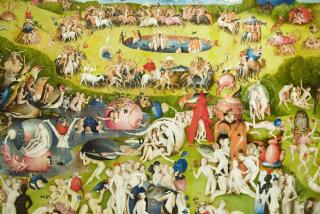Dying is part of the script
- Share via
Here’s what we know about the end of the world: It will be televised, and if the reality TV people can get hold of it, it will be spectacularly staged and styled.
Suzanne Collins’ enthralling, imaginative and creepy novel “The Hunger Games” (Scholastic: $17.99, ages 12 and up) takes place after an apocalyptic war has reshaped the remains of North America into the nation of Panem. The central government rules brutally over 12 outlying districts. Once a year, as a reminder of their bondage, the districts are forced to offer up one teenage boy and girl for the Hunger Games, in which the 24 “tributes” fight one another to the death in a ritual battle that combines the brutality of the Roman gladiators with the exotic locales and elaborate social strategies of “Survivor.” The whole thing is televised for the nation, complete with gushing interviews, sneak-peek tests of skill and personal background stories on the participants. Viewing is mandatory; wouldn’t our networks love that?
As with any good dystopian novel, the world looks very much like our own, with a few slightly distorted elements. Life in the districts has devolved into a kind of medieval grubbiness. Hunger is rampant, and the means to produce anything of value is strictly controlled. Possession of a goat is a luxury. Our heroine, Katniss, has the rare nerve to cross the electric fence that keeps the town “safe” from the surrounding wilderness and the rare skill to hunt and forage in the forest.
At the same time, our age’s peculiar willingness to expose ourselves on television has become bizarre media savvy in Katniss’ world. When she is taken as this year’s female “tribute” from District 12 -- offering herself in place of her younger sister -- she instinctively understands that she needs a photogenic persona to have a chance at survival. Her skills with a bow and arrow may be a matter of life and death, but the more the television audience loves her, the more leverage she has in the inevitably manipulated show. When she is paired with a hapless baker’s son with a crush on her, the stage is set for a tale of romance that the audience will love: In order for the games to succeed, one star-crossed lover will have to kill the other.
As a send-up of TV shows like “Survivor,” “The Hunger Games” is endlessly entertaining. The stylists assigned to each tribute are in desperate competition with one another to make the victims appealing to the television audience and, therefore, more appealing to sponsors, whose care packages of vital necessities, such as food or medicine, float into the arena on silver parachutes.
The strategizing about alliances and their eventual breakdown parodies every fatuous conversation you’ve ever heard about why “Survivor” teaches valuable life skills. Collins also captures the hilariously self-referential nature of the reality TV obsession. When Katniss returns, battered, scarred but ostensibly triumphant, her stylists fuss over her restorative makeup for the exit interview. Instead of asking her what happened in the arena, they chatter among themselves “all about where they were or what they were doing or how they felt when a specific event occurred. . . . Everything is about them, not the dying boys and girls in the arena.” And readers can almost hear the “upbeat” musical score that accompanies the televised highlights of the bloodiest moments.
The suggested age range for the novel’s readers is 12 and up, but since an astonishing number of families consider “Survivor” perfectly fine family entertainment, I’d say that any fans of “Survivor” could handle this book. The romance is very tame, and the nastiness of reality TV far exceeds the mildly graphic violence of “The Hunger Games,” where the only rule is no cannibalism, because it doesn’t make good television. (Collins’ last series, “The Underland Chronicles,” is highly recommended for the Rick Riordan audience of 9-to-12-year-olds in search of adventure books.)
Curiously, by the time the novel draws to a conclusion, it has backed off its social commentary and become almost 100% love story, so that when the train delivers its winners back home, Katniss’ overwhelming concern is not how to avoid transforming herself into an unwilling mentor in next year’s gruesome games but which boy she will hook up with.
It’s a classic teen-novel dilemma: to give oneself up to the mysterious lover or to the loyal friend? (For fans of Stephenie Meyer’s vampire novels, Edward or Jacob?) “The Hunger Games” promises to be the first of a series, and although I don’t immediately see where Collins might go with this story, I’m willing to believe she’ll surprise me.
Sonja Bolle’s Word Play column appears monthly at www.latimes.com/books.
More to Read
The biggest entertainment stories
Get our big stories about Hollywood, film, television, music, arts, culture and more right in your inbox as soon as they publish.
You may occasionally receive promotional content from the Los Angeles Times.









